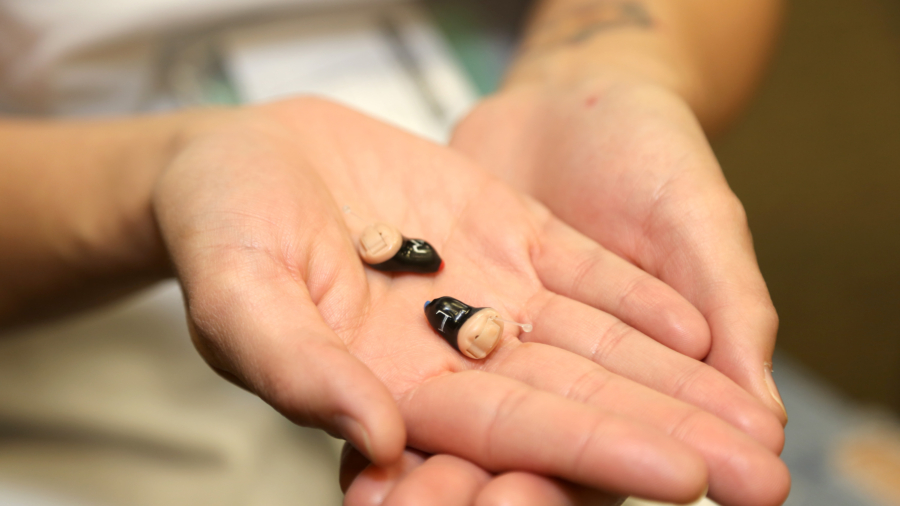People who suffer from hearing loss and use aids have a lower risk of mortality and dementia compared to those who never use the devices, according to two new studies.
One study, published in The Lancet on Jan. 3, examined the association between hearing loss, use of hearing aids, and mortality among Americans. Researchers looked at data from 9,985 adults, out of which 1,863 suffered from hearing loss. “We found that adults with hearing loss who regularly used hearing aids had a 24 percent lower risk of mortality than those who never wore them,” said Janet Choi, lead researcher of the study.
“These results are exciting because they suggest that hearing aids may play a protective role in people’s health and prevent early death.”
The data on 9,985 adults were collected from the National Health and Nutrition Examination Survey between 1999 and 2012. The individuals completed audiometry tests, which measure hearing ability. The participants’ mortality status was followed up for an average of around 10 years.
Out of 1,863 adults who were identified as having hearing loss, 237 people used hearing aids “regularly,” 143 were “non-regular” users, and 1,483 were “never users.”
“The risk of mortality was lower among adults who reported ‘regular’ hearing aid use than ‘never’ hearing aid users when adjusting for age and severity of hearing loss,” the study stated.
However, “when comparing ‘non-regular’ hearing aid users to ‘never’ users, there were no significant differences in mortality risk.” This potentially suggests that occasional use of hearing aids does not provide any life-extending benefit to people with hearing loss when compared to regular use.
In addition, the study also found that more severe levels of hearing loss were associated with higher risks of mortality. Researchers pointed out that this has been confirmed by earlier studies, which “identified hearing loss as a major risk factor for adverse health outcomes including reduced quality of life, depression, dementia, and mortality.”
“However, whether treatment of hearing loss with hearing aid use is associated with lower risks of mortality is currently unknown.” This study aimed to resolve this knowledge gap.
The study has declared multiple conflicts of interest. Author Janet Choi reported receiving a grant from the Lions Hearing Foundation. Another author served on a medical advisory council to Advanced Bionics, which manufactures hearing aids.
A third author is a consultant to biotech firm Frequency Therapeutics and Apple. This person is also the director of a public health research center which is funded partly by donations given by hearing implant manufacturer Cochlear to the Johns Hopkins Bloomberg School of Public Health.
The authors declared receiving no funding for the study.
Dementia Benefits, Side Effects
A second study, published in the JAMA journal on Jan. 4, investigated whether hearing loss is associated with the risk of dementia among people who use or do not use hearing aids.
The study was conducted in Denmark and collected data from more than 500,000 people aged 50 and above between 2003 and 2017, out of which over 23,000 cases of dementia were identified. The individuals were followed for a mean period of 8.6 years.
“Having a hearing loss was associated with an increased risk of dementia,” the study said. “Severe hearing loss in the better and worse ear was associated with a higher dementia risk.”
“Compared with people without hearing loss, the risk of dementia was higher among people with hearing loss who were not using hearing aids than those who had hearing loss and were using hearing aids,” it said.
The study suggested that “hearing aids might prevent or delay the onset and progression of dementia.”
While the two studies describe the potential benefits of hearing aids, the devices also come with some likely side effects that must be taken into account.
For instance, some people may experience headaches and ringing in the ears when using hearing aids if the volume is not at the correct level. A poor-fitting hearing aid can cause discomfort and skin irritation. Itchy ear canals are also a source of concern among those who wear these devices.
A 2019 survey of 512 individuals who suffered hearing loss and were regular hearing aid users asked participants about side effects while using the devices. The questionnaire listed 32 potential side effects—physical, psychological, and social.
It found that some users reported experiencing side effects like headaches, blisters, dizziness, and problems chewing or swallowing while using hearing aids.
According to data from the National Institute on Deafness and Other Communication Disorders, one in eight Americans aged 12 and above has hearing loss in both years based on standard hearing examinations.
“About 28.8 million U.S. adults could benefit from using hearing aids,” it said. “Among adults aged 70 and older with hearing loss who could benefit from hearing aids, fewer than one in three (30 percent) has ever used them.”
“Even fewer adults aged 20 to 69 (approximately 16 percent) who could benefit from wearing hearing aids have ever used them.”
From The Epoch Times


